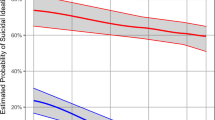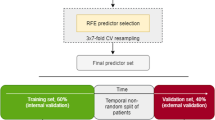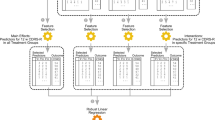Abstract
The study aimed to: (1) Identify distinct trajectories of change in depressive symptoms by mid-treatment during psychotherapy for late-life depression with executive dysfunction; (2) examine if nonresponse by mid-treatment predicted poor response at treatment end; and (3) identify baseline characteristics predicting an early nonresponse trajectory by mid-treatment. A sample of 221 adults 60 years and older with major depression and executive dysfunction were randomized to 12 weeks of either problem-solving therapy or supportive therapy. We used Latent Growth Mixture Models (LGMM) to detect subgroups with distinct trajectories of change in depression by mid-treatment (6th week). We conducted regression analyses with LGMM subgroups as predictors of response at treatment end. We used random forest machine learning algorithms to identify baseline predictors of LGMM trajectories. We found that ~77.5% of participants had a declining trajectory of depression in weeks 0–6, while the remaining 22.5% had a persisting depression trajectory, with no treatment differences. The LGMM trajectories predicted remission and response at treatment end. A random forests model with high prediction accuracy (80%) showed that the strongest modifiable predictors of the persisting depression trajectory were low perceived social support, followed by high neuroticism, low treatment expectancy, and low perception of the therapist as accepting. Our results suggest that modifiable risk factors of early nonresponse to psychotherapy can be identified at the outset of treatment and addressed with targeted personalized interventions. Therapists may focus on increasing meaningful social interactions, addressing concerns related to treatment benefits, and creating a positive working relationship.
This is a preview of subscription content, access via your institution
Access options
Subscribe to this journal
Receive 12 print issues and online access
$259.00 per year
only $21.58 per issue
Buy this article
- Purchase on Springer Link
- Instant access to full article PDF
Prices may be subject to local taxes which are calculated during checkout



Similar content being viewed by others
Notes
The missing pattern of predictors at baseline was sporadic across the sample with no consistent patterns. That is, no specific subset of predictors had more missing data than other sets. In addition, there were no significant concurrent missing patterns among any pair of variables.
References
Kok RM, Reynolds CF. Management of depression in older adults. JAMA. 2017;317:2114 https://doi.org/10.1001/jama.2017.5706.
Alexopoulos GS, Sirey JA, Banerjee S, Jackson DS, Kiosses DN, Pollari C, et al. Two interventions for patients with major depression and severe chronic obstructive pulmonary disease: impact on dyspnea-related disability. Am J Geriatr Psychiatry. 2018;26:162–71. https://doi.org/10.1016/j.jagp.2017.10.002.
Manning KJ, Steffens DC. State of the science of neural systems in late-life depression: Impact on clinical presentation and treatment outcome. J Am Geriatr Soc. 2018;66:17–23. https://doi.org/10.1111/jgs.15353.
Manning KJ, Alexopoulos GS, Banerjee S, Morimoto SS, Seirup JK, Klimstra SA, et al. Executive functioning complaints and escitalopram treatment response in late-life depression. Am J Geriatr Psychiatry. 2015;23:440–5. https://doi.org/10.1016/j.jagp.2013.11.005.
Alexopoulos GS, Manning K, Kanellopoulos D, McGovern A, Seirup JK, Banerjee S, et al. Cognitive control, reward-related decision making and outcomes of late-life depression treated with an antidepressant. Psychol Med. 2015;45:3111–20. https://doi.org/10.1017/S0033291715001075.
Areán PA, Raue P, Mackin RS, Kanellopoulos D, McCulloch C, Alexopoulos GS. Problem-solving therapy and supportive therapy in older adults with major depression and executive dysfunction. Am J Psychiatry. 2010;167:1391–8. https://doi.org/10.1176/appi.ajp.2010.09091327.
Alexopoulos GS, Raue PJ, Kiosses DN, Mackin RS, Kanellopoulos D, McCulloch C, et al. Problem-solving therapy and supportive therapy in older adults with major depression and executive dysfunction. Arch Gen Psychiatry. 2011;68:33 https://doi.org/10.1001/archgenpsychiatry.2010.177.
Kelley ME, Dunlop BW, Nemeroff CB, Lori A, Carrillo-Roa T, Binder EB, et al. Response rate profiles for major depressive disorder: characterizing early response and longitudinal nonresponse. Depress Anxiety. 2018;35:992–1000. https://doi.org/10.1002/da.22832.
Lewis CC, Simons AD, Kim HK. The role of early symptom trajectories and pretreatment variables in predicting treatment response to cognitive behavioral therapy. J Consult Clin Psychol. 2012;80:525–34. https://doi.org/10.1037/a0029131.
Persons JB, Thomas C. Symptom severity at week 4 of cognitive-behavior therapy predicts depression remission. Behav Ther 2018;50:791–802. https://doi.org/10.1016/J.BETH.2018.12.002.
Chekroud AM, Zotti RJ, Shehzad Z, Gueorguieva R, Johnson MK, Trivedi H, et al. Cross-trial prediction of treatment outcome in depression: a machine learning approach. Lancet Psychiatry. 2016;3:243–50. https://doi.org/10.1016/S2215-0366(15)00471-X.
Lee Y, Ragguett R-M, Mansur RB, Boutilier JJ, Rosenblat JD, Trevizol A, et al. Applications of machine learning algorithms to predict therapeutic outcomes in depression: a meta-analysis and systematic review. Published online. 2018. https://doi.org/10.1016/j.jad.2018.08.073.
First MB, Spitzer RL, Gibbon M, Williams JB. Structured clinical interview for DSM-IV axis I disorders, patient version (SCID-P), version 2. New York: New York State Psychiatric Institute Biometrics Research; 1995.
Hamilton M. A rating scale for depression. J Neurol Neurosurg Psychiatry. 1960;23:56–62.
Folstein M, Folstein S, McHugh P. “Mini-mental state”. A practical method for grading the cognitive state of patients for the clinician. J Psychiatr Res. 1975;12:189–98. https://doi.org/10.1016/0022-3956(75)90026-6.
Mattis S. Dementia Rating Scale professional manual. Psychological Assessment Resources; 1988. https://doi.org/10.4236/psych.2012.33032.
Perret E. The left frontal lobe of man and the suppression of habitual responses in verbal categorical behaviour. Neuropsychologia. 1974;12:323–30. https://doi.org/10.1016/0028-3932(74)90047-5.
World Health Organization. World Health Organization Disability Assessment Schedule (WHODAS II). Geneva, Switzerland: WHO; 2000.
McCrae RR, John OP. An introduction to the five‐factor model and its applications. J Pers. 1992;60:175–215. https://doi.org/10.1111/j.1467-6494.1992.tb00970.x.
Marin RS, Biedrzycki RC, Firinciogullari S. Reliability and validity of the apathy evaluation scale. Psychiatry Res. 1991;38:143–62. https://doi.org/10.1016/0165-1781(91)90040-V.
Koenig HG, Westlund RE, Linda George MK, Hughes DC, Blazer DG, Hybels C. Abbreviating the Duke Social Support Index for use in chronically ill elderly individuals. Psychosomatics. 1993;34:61–69. https://doi.org/10.1016/S0033-3182(93)71928-3.
Borkovec TD, Nau SD. Credibility of analogue therapy rationales. J Behav Ther Exp Psychiatry. 1972;3:257–60. https://doi.org/10.1016/0005-7916(72)90045-6.
Lorr M. Client perceptions of therapists: a study of the therapeutic relation. J Consult Psychol. 1965;29:146–9. https://doi.org/10.1037/h0021924.
Mchorney CA, Ware JE, Raczek AE. The MOS 36-item short-form health survey (SF-36): II. Psychometric and clinical tests of validity in measuring physical and mental health constructs. Med Care. 1993;31:247–63. https://pdfs.semanticscholar.org/aa08/ac3c784705b96e2b6ae92b048642f9e67bda.pdf. Accessed 7 Jun 2019.
Wolf PA, D’Agostino RB, Belanger AJ, Kannel WB. Probability of stroke: a risk profile from the framingham study. Stroke 1991;22:312–8. https://doi.org/10.1161/01.STR.22.3.312.
Proust-Lima C, Philipps V, Liquet B. Estimation of extended mixed models using latent classes and latent processes: the R package lcmm. Published online. 2015. https://doi.org/10.18637/jss.v078.i02.
Schwarzbach M, Luppa M, Forstmeier S, König HH, Riedel-Heller SG. Social relations and depression in late life—a systematic review. Int J Geriatr Psychiatry. 2014;29:1–21. https://doi.org/10.1002/gps.3971.
Hallgren M, Lundin A, Tee FY, Burström B, Forsell Y. Somebody to lean on: social relationships predict post-treatment depression severity in adults. Psychiatry Res. 2017;249:261–7. https://doi.org/10.1016/j.psychres.2016.12.060.
Solomonov N, Bress JN, Anne Sirey JA, Gunning FM, Flückiger C, Raue PJ, et al. Engagement in socially and interpersonally rewarding activities as a predictor of outcome in ‘Engage’ behavioral activation therapy for late-life depression. Am J Geriatr Psychiatry. 2019;27:571–8. https://doi.org/10.1016/j.jagp.2018.12.033.
Alexopoulos GS, Areán PA. A model for streamlining psychotherapy in the RDoC era: the example of “Engage”. Mol Psychiatry. 2014;19:14–19. https://doi.org/10.1038/mp.2013.150.
Kendler KS, Gatz M, Gardner CO, Pedersen NL. Personality and major depression. Arch Gen Psychiatry. 2006;63:1113 https://doi.org/10.1001/archpsyc.63.10.1113.
Steffens DC, Wu R, Grady JJ, Manning KJ. Presence of neuroticism and antidepressant remission rates in late-life depression: results from the Neurobiology of Late-Life Depression (NBOLD) study. Int Psychogeriatr. 2018;30:1069–74. https://doi.org/10.1017/S1041610217002551.
Kapogiannis D, Sutin A, Davatzikos C, Costa P, Resnick S. The five factors of personality and regional cortical variability in the baltimore longitudinal study of aging. Hum Brain Mapp. 2013;34:2829–40. https://doi.org/10.1002/hbm.22108.
Constantino MJ, Arnkoff DB, Glass CR, Ametrano RM, Smith JZ. Expectations. J Clin Psychol. 2011;67:184–92. https://doi.org/10.1002/jclp.20754.
Flückiger C, Del ReAC, Wampold BE, Horvath AO. The alliance in adult psychotherapy: a meta-analytic synthesis. Psychotherapy. 2018;55:316–40. https://doi.org/10.1037/pst0000172.
Palpacuer C, Gallet L, Drapier D, Reymann JM, Falissard B, Naudet F. Specific and non-specific effects of psychotherapeutic interventions for depression: results from a meta-analysis of 84 studies. J Psychiatr Res. 2017;87:95–104. https://doi.org/10.1016/j.jpsychires.2016.12.015.
Cuijpers P, Reijnders M, Huibers MJH. The role of common factors in psychotherapy outcomes. Annu Rev Clin Psychol. 2019;15:207–31. https://doi.org/10.1146/annurev-clinpsy-050718-095424.
Elkin I, Gibbons RD, Shea MT, Sotsky SM, Watkins JT, Pilkonis PA, et al. Initial severity and differential treatment outcome in the National Institute of Mental Health Treatment of Depression Collaborative Research Program. J Consult Clin Psychol. 1995;63:841–7. https://doi.org/10.1037/0022-006X.63.5.841.
Cuijpers P, Andersson G, Donker T, Van Straten A. Psychological treatment of depression: results of a series of meta-analyses. Nord J Psychiatry. 2011;65:354–64. https://doi.org/10.3109/08039488.2011.596570.
Cowan MJ, Freedland KE, Burg MM, Saab PG, Youngblood ME, Cornell CE, et al. Predictors of treatment response for depression and inadequate social support—the ENRICHD randomized clinical trial. Psychother Psychosom. 2007;77:27–37. https://doi.org/10.1159/000110057.
Armstrong L, Rimes KA. Mindfulness-based cognitive therapy for neuroticism (stress vulnerability): a pilot randomized study. Behav Ther. 2016;47:287–98. https://doi.org/10.1016/j.beth.2015.12.005.
Funding
This research was funded by National Institute of Mental Health grants P50 MH113838, R01 MH064099, R01 MH063982, T32 MH019132, K23 MH123864, and the Sanchez Foundation.
Author information
Authors and Affiliations
Corresponding author
Ethics declarations
Conflict of interest
GSA serves on the Eisai Advisory Board and Otsuka Speakers Bureau. He also served on the Speakers Bureaus of Allergan and Takeda-Lundbeck and Janssen Advisory Board. TDH is an employee of “Talk Space.” All other authors report no conflict of interest.
Additional information
Publisher’s note Springer Nature remains neutral with regard to jurisdictional claims in published maps and institutional affiliations.
Rights and permissions
About this article
Cite this article
Solomonov, N., Lee, J., Banerjee, S. et al. Modifiable predictors of nonresponse to psychotherapies for late-life depression with executive dysfunction: a machine learning approach. Mol Psychiatry 26, 5190–5198 (2021). https://doi.org/10.1038/s41380-020-0836-z
Received:
Revised:
Accepted:
Published:
Issue Date:
DOI: https://doi.org/10.1038/s41380-020-0836-z
This article is cited by
-
Unravelling the complexities of depression with medical intelligence: exploring the interplay of genetics, hormones, and brain function
Complex & Intelligent Systems (2024)
-
Modifiable predictors of suicidal ideation during psychotherapy for late-life major depression. A machine learning approach
Translational Psychiatry (2021)



